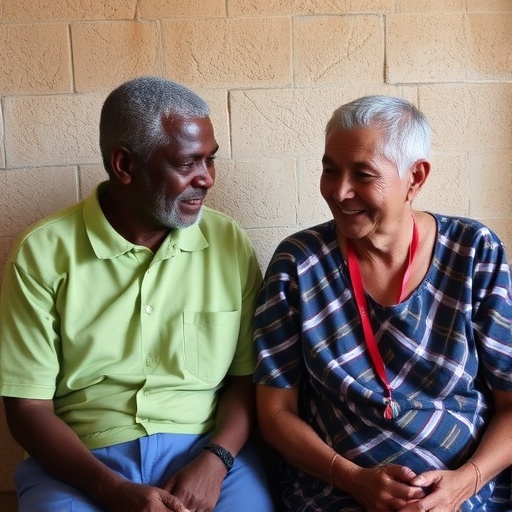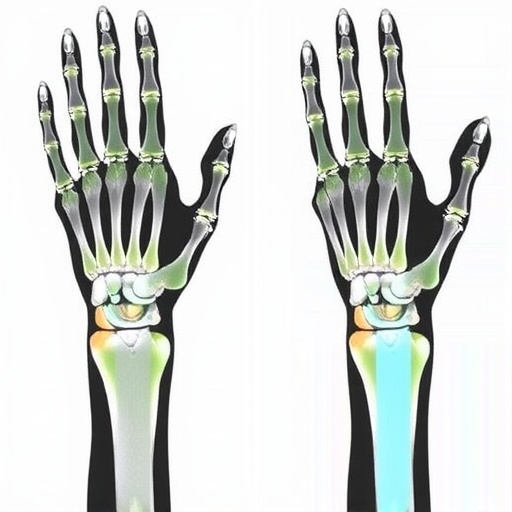
The study of cognitive disability among older adults has become an area of great importance as global demographics shift towards an aging population. Particularly in Botswana, where socioeconomic transitions and healthcare improvements continue to evolve, understanding the nuances of cognitive disorders has never been more critical. A pioneering research conducted by Monamo, T.T., Keetile, M., and Letamo, G. provides a comprehensive examination of this matter, revealing alarming trends and sociodemographic determinants that affect the prevalence of cognitive disabilities in Botswana.
Cognitive disability, often characterized by deficits in memory, attention, and problem-solving abilities, poses significant challenges for individuals, families, and communities. In Botswana, where the population of older adults is rapidly increasing, the implications of cognitive disabilities are profound. This study sheds light on the prevalence of such conditions and how various demographic factors correlate with cognitive health in later life. As the world becomes more aware of mental health, particularly in older adults, this research contributes valuable data to inform policymakers and healthcare providers.
The cross-sectional data analyzed in the study were collected from diverse regions across Botswana, providing a holistic view of the cognitive landscape in the country. Through rigorous statistical methods, the researchers were able to determine not only the prevalence rates but also the demographic trends that appeared to influence cognitive disabilities. This systemic approach allows for a more accurate representation of the challenges faced by the aging population, paving the way for targeted interventions and prevention strategies. Understanding how different regions and communities are affected by cognitive disabilities can help tailor public health initiatives effectively.
Furthermore, the research delves into sociodemographic determinants that are associated with cognitive disabilities. Factors such as education level, income, residential location, and social engagement can significantly impact cognitive health. The study’s findings highlight that lower educational attainment and lack of social networks correlate with higher instances of cognitive decline. In a society where educational access and socioeconomic opportunities are still evolving, these insights are vital for addressing the potential future burden of cognitive disabilities.
One of the most striking aspects of the research is its depiction of trends over time in the prevalence of cognitive disabilities in Botswana. Historical data have shown a gradual increase, a phenomenon that can be attributed to numerous factors, including lifestyle changes and increased life expectancy. The traditional family structures that once supported older adults are shifting, leading to isolation and decreased cognitive engagement. As such, the researchers call for an urgent reevaluation of social support systems aimed at older adults to enhance their quality of life and cognitive functioning.
Interestingly, the study does not shy away from discussing the implications of cultural factors in Botswana that affect cognitive health. Traditional beliefs and stigma surrounding mental health often create barriers to seeking assistance for cognitive disabilities. Understanding how cultural perceptions intersect with healthcare access can inform strategies to promote mental wellness among older adults. Initiatives that are culturally sensitive and community-based are essential to breaking down these barriers and improving cognitive health.
Moreover, as the healthcare infrastructure continues to develop in Botswana, integrating mental health services into geriatric care will be crucial. The findings indicate that older adults are often screened for physical health conditions, while cognitive assessments are overlooked. This study makes a strong argument for the inclusion of cognitive evaluations in routine health checks for older adults, thereby facilitating early detection and timely intervention.
Stakeholders in the healthcare sector must take heed of the implications that the findings present. As more individuals are diagnosed with cognitive disabilities, the demand for specialized care will likely rise. The study advocates for training healthcare professionals in providing comprehensive geriatric assessments that address both physical and cognitive health. This holistic approach can improve outcomes and ensure that older adults receive the multi-faceted care they require.
Additionally, the research underscores the importance of community involvement in supporting older adults with cognitive disabilities. Community programs that encourage social interactions, cognitive engagement, and physical activities can play a pivotal role in staving off cognitive decline. By fostering environments that promote mental stimulation and social connectedness, communities can significantly impact the cognitive health of their older populations.
As we navigate the implications of these findings, it is vital to consider the role of technology in enhancing cognitive health among older adults. Innovations such as telehealth services, mobile health applications, and cognitive training programs offer promising avenues for improving access to mental health support. These technological tools can bridge the gap for older adults who may have difficulty accessing traditional healthcare infrastructure, thereby supporting their cognitive well-being.
While the study highlights alarming trends in cognitive disabilities, it also offers a hopeful perspective. With greater awareness and improved resources, Botswana has the potential to address the challenges posed by cognitive decline. By investing in education, healthcare access, and community initiatives, the society can cultivate an environment that champions the cognitive health of its older citizens.
As the research by Monamo, Keetile, and Letamo indicates, understanding the prevalence, trends, and sociodemographic determinants of cognitive disability is essential for creating effective interventions and policies in Botswana. The time for action is now, as the implications of inaction will be felt not just by individuals, but by society as a whole. Engaging in discussions about cognitive health for older adults can lead to transformative changes that will benefit future generations.
In conclusion, the study serves as a clarion call for researchers, healthcare providers, and policymakers alike. The findings compel us to confront the realities of cognitive disabilities head-on and seek solutions that are grounded in data and the lived experiences of older adults. By prioritizing research and action in this critical area, we can foster a future where cognitive health is valued, supported, and preserved for all older adults in Botswana.
Subject of Research: Cognitive Disability among Older Adults in Botswana
Article Title: Cognitive disability among older adults in Botswana: prevalence, trends, and sociodemographic determinants from cross-sectional data.
Article References:
Monamo, T.T., Keetile, M. & Letamo, G. Cognitive disability among older adults in Botswana: prevalence, trends, and sociodemographic determinants from cross-sectional data.
BMC Geriatr 25, 670 (2025). https://doi.org/10.1186/s12877-025-06383-w
Image Credits: AI Generated
DOI: 10.1186/s12877-025-06383-w
Keywords: Cognitive disability, older adults, Botswana, prevalence, sociodemographic determinants, healthcare policy
Tags: aging and mental health policy implicationsaging population challenges in BotswanaBotswana healthcare and aging population challengescognitive disability in older adultscognitive health trends in Botswanacross-sectional study on cognitive healthhealthcare improvements and cognitive disabilitiesimplications of cognitive decline in familiesmental health awareness in older adultsprevalence of cognitive disorders in older populationssociodemographic factors affecting cognitive disordersstatistical analysis of cognitive disability




